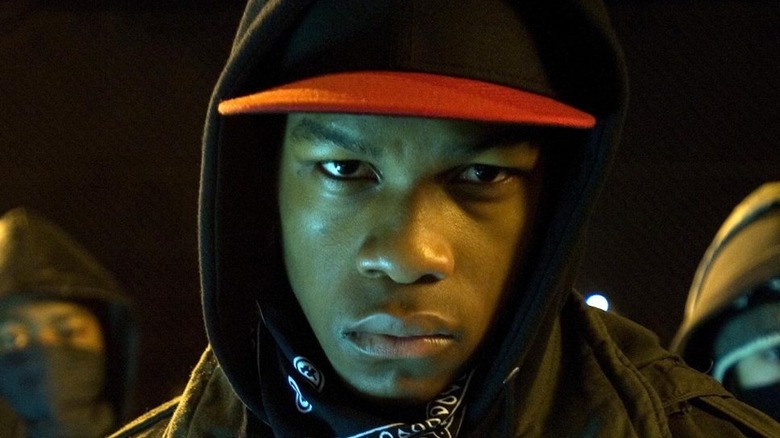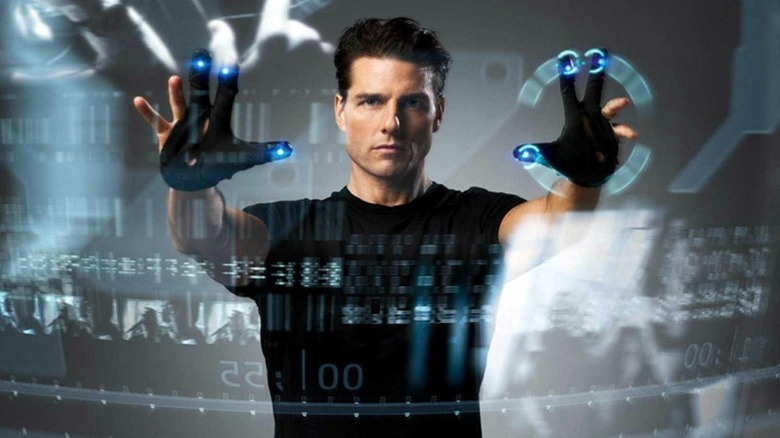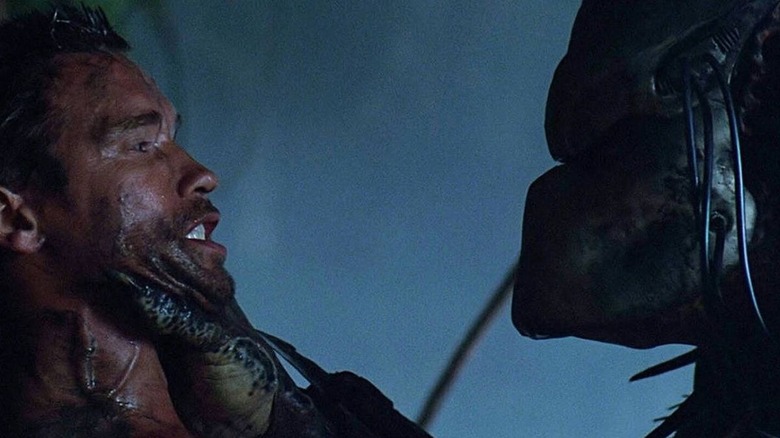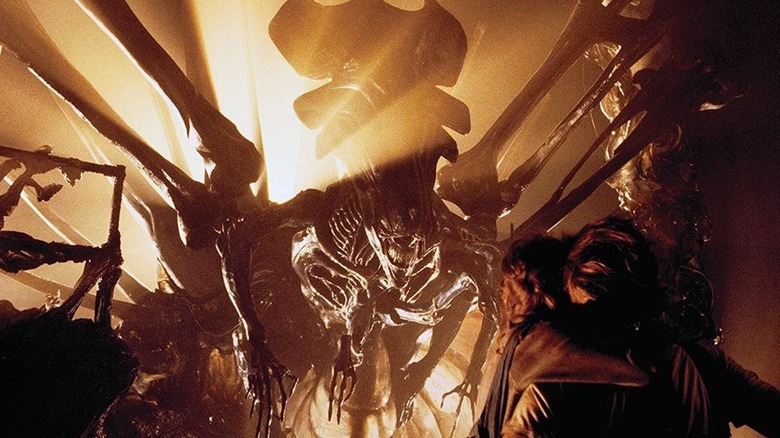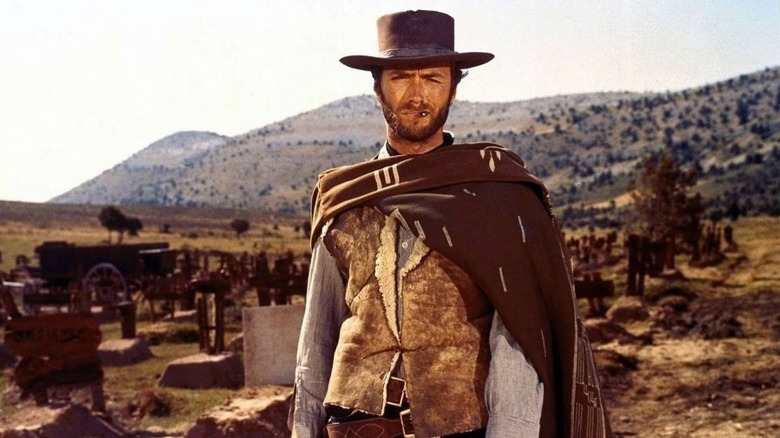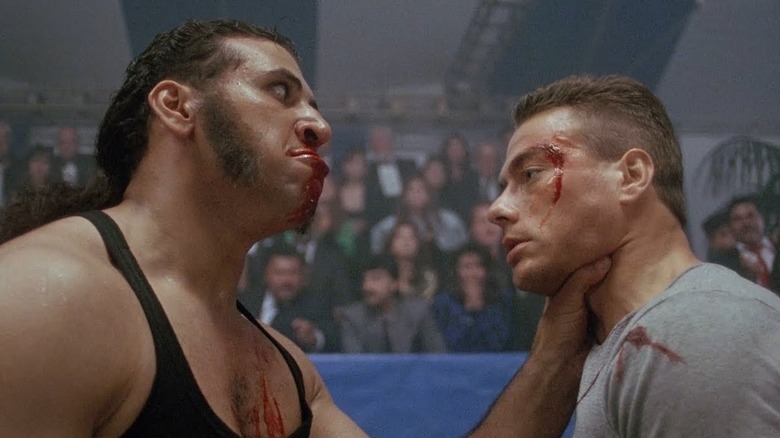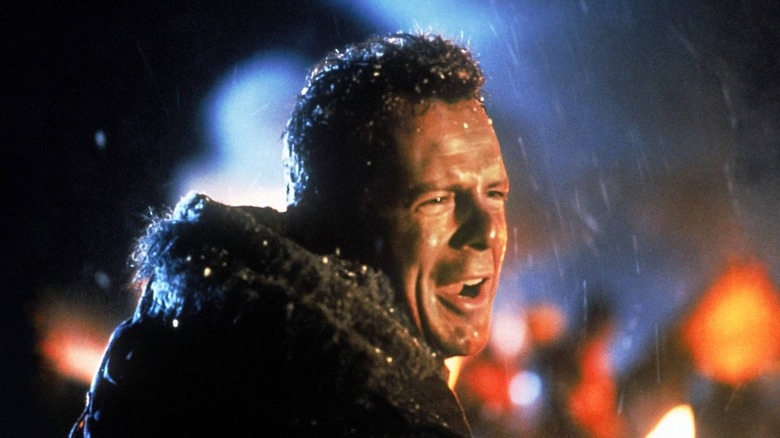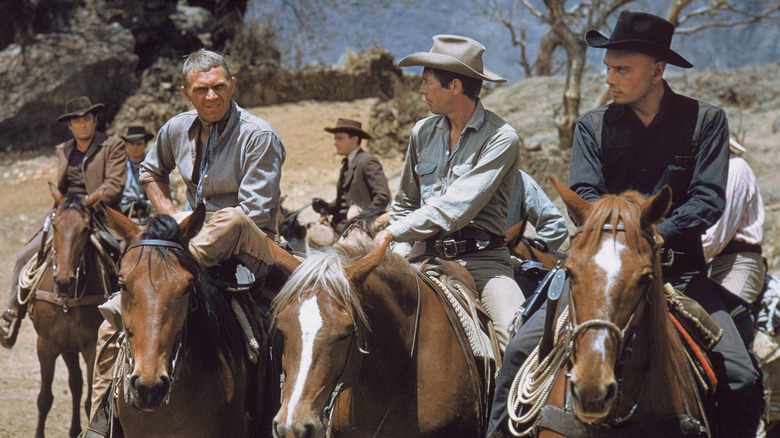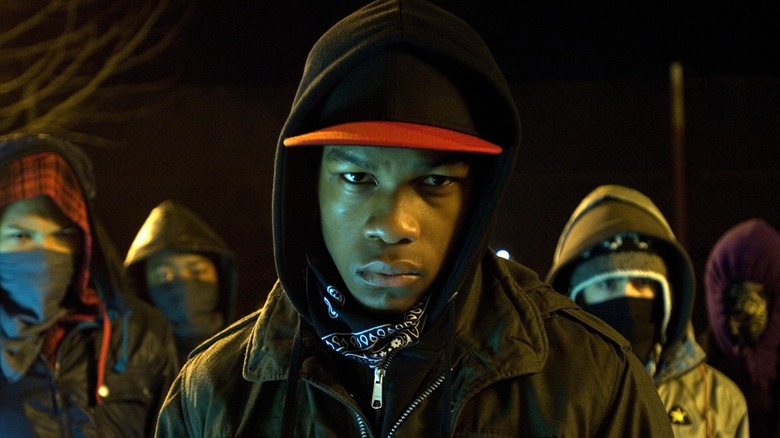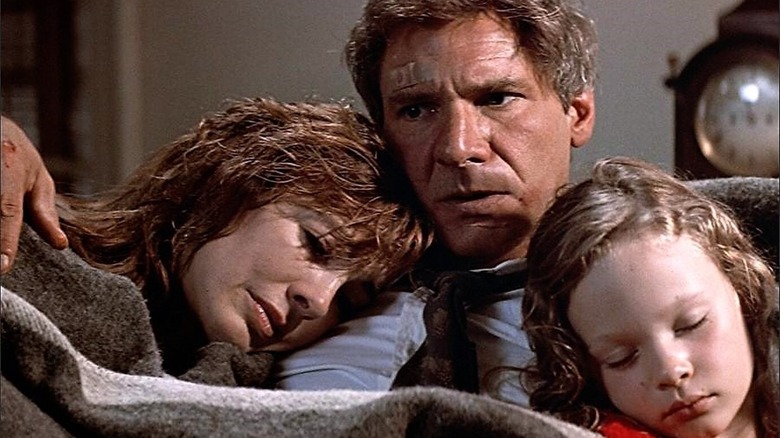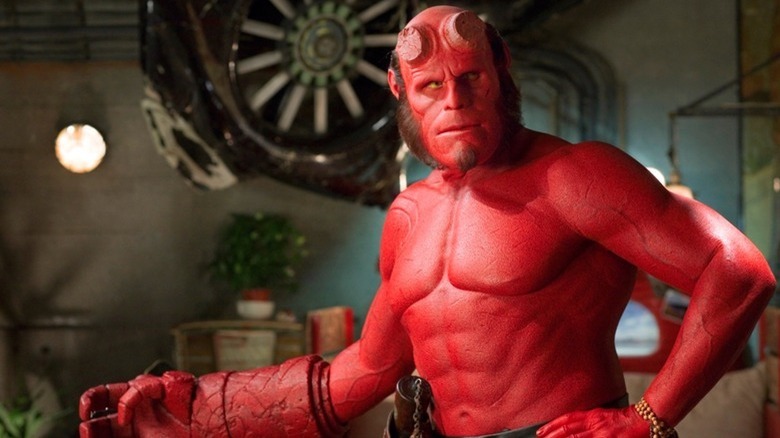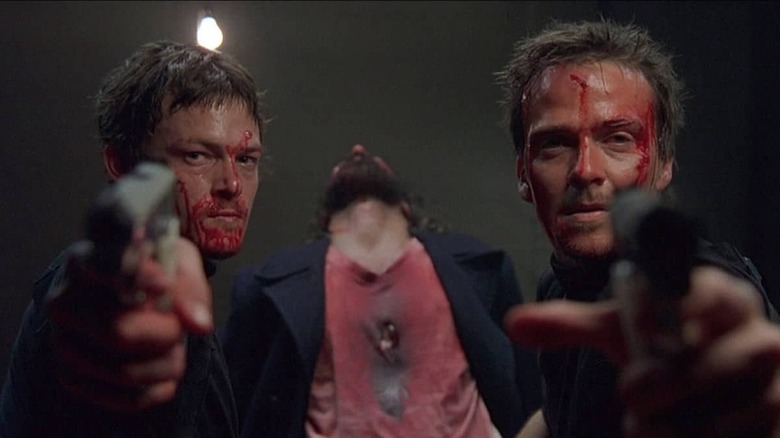The 12 Best Action Movies On Amazon Prime Right Now
Ever since "Iron Man," studios have been trying, almost like clockwork, to make action movies using the Marvel formula. "The Suicide Squad" was just "Guardians of the Galaxy" with bad dudes. "Justice League" was "The Avengers," but worse. And every A-list actor under the sun has suddenly tried to become a money-making superhero. Aside from the flying cars of the "Fast & Furious" franchise and the occasional chapter of "John Wick" or "Mission: Impossible," superhero films rule the day, action-wise.
But in decades past, action was a genre dominated by testosterone-heavy war movies, westerns, and stories about men who should have died several hundred times during the course of a day. They were the sillier, dumber older siblings of the action films we see today. They deserve their just dues. So, for education's sake, here are 12 of the best action movies from the pre-Marvel era that just happen to be on Amazon Prime. Fire up your streaming box and see what action cinema used to be like.
Minority Report
In 2002, this Tom Cruise-Steven Spielberg collaboration seemed about as cool and futuristic as the then-innovative Internet Explorer. Now granted, the debut of a now-dead web browser and "Minority Report" aren't exactly in the same wheelhouse, but consider this: Stephen Spielberg directed one of the most prophetic sci-fi films ever made when it comes to our relationship with technology. At the time, the movie's pupil-reading, its personalized ads, itsmotion-sensitive interfaces, and its large touch screen computers showcased a unique, seemingly far-off vision of the future. Fast forward a few years, and now we have smartphones equipped with all this cool "Minority Report"-like technology resting in our hands. It no longer feels fresh — a la, like Internet Explorer.
Set in Washington, D.C. in the year 2054, "Minority Report" loosely sticks to the spine of the 1956 Philip K. Dick story of the same name, which imagines a world of PreCrime. Traditional judges and juries are essentially obsolete, thanks to a system that predicts crimes before they happen. To this day, "Minority Report" is about as glumly lit — and just generally glum — as Spielberg gets, but it's still a solid action film from beginning to end.
Predator
Although one may claim to have biceps, telling others that you "have biceps" can only go so far when the likes of Arnold Schwarzenegger and Carl Weathers are on your television screen. In 1987, John McTiernan directed one of the manliest action films out there in "Predator," the apex of Schwarzenegger's muscled fame.
Every old action film is a striptease. It peels away the layers — in the case of this science fiction classic, a bunch of unstoppable Reagan-era soldiers (Arnold, Carl, Bill Duke, Jesse Ventura, Sonny Landham, Richard Chaves, and Shane Black) who are pitted against an unstoppable extraterrestrial foe — and says go.
Cinematographer Donald McAlpine gives a master class in camerawork that draws the audience in. Rather than leaning on the horrific image of fully visible aliens, McAlpine creates dread through an invisible game of cat-and-mouse that amounts to one effortless murder after the other. Great stuff.
Aliens
If there's anything about the Alien franchise that's beyond dispute, it's that "Aliens" (1986) is an action movie and "Alien" is not. That's the argument. There's no counter. "Alien," directed by Ridley Scott, was an edge-of-your-seat sci-fi horror film that also flirted with body-horror, war movie tropes, and a commentary about the '70s working class. There's a whole lot of running, but very little shooting; Ripley (Sigourney Weaver) takes a job, a smiling Xenomorph hitches a ride, and one working stiff after another — Yaphet Kotto, Harry Dean Stanton, Veronica Cartwright, John Hurt, and Tom Skerritt — takes a turn screaming.
"Aliens," in stark contrast to the original, exchanges a ship full of labor workers for a crew of cocky, stereotypical troops, including Weaver and Bill "Game over, Man!" Paxton, and shares a similar slow burn in the first half hour. But, like a storm landing on shore, once the trigger is pulled on the now-plural aliens, the running and gunning starts in earnest. From that point on, "Aliens" becomes an unrelenting action movie for a good hour and change.
A Fistful of Dollars
Everyone should know the look: his eyes squinting into camera, the curled lip, his hands hovering above his handgun and rifles. It's the standard spaghetti western vibe, a world in which a mysterious stranger will sometimes pop up and perform acts of heroism against mustache-twirling villains. "A Fistful of Dollars" (1964), modeled on Akira Kurosawa's classic "Yojimbo" (1961), is one of many Clint Eastwood westerns directed by Sergio Leone, and remains an action classic to this day.
Clearly, there's a timeless power and beauty to stories about outsiders who enter bleak situations and step up to play hero. Here, Eastwood is a man of few words, with the fewest lines and the fastest trigger fingers in a grim Mexican town terrorized by bandits. The musical score by Ennio Morricone follows Eastwood like a good right-hand man, spicing up duels with bells and percussive atmosphere. With a chewed cigar here and some hoarse words there, it's easy to see why "A Fistful of Dollars" is so respected for its gun-slinging action.
Lionheart
Among all action stars, Jean-Claude Van Damme stands out as one of the best drivers of a B-movie vehicle. Seriously, to watch "Lionheart" from 1990 is to witness Damme's transition from an movie star into his own subgenre: maximus gluteus buttocks, underground fights, some awkward sexual tension, an impossible final boss, and a comedic sidekick who yells the same line three separate times, "This dude's gonna kill your ass, don't you know that?"
Directed by Sheldon Lettich, a combat vet turned screenwriter, "Lionheart" is a story that's bare to the bone: Damme escapes the military and ends up in America. Suddenly, he has to escape the French Foreign Legion, take on some dudes in an underground fighting tournament to raise money for his brother's widow and her daughter, and deal with a fling on the side. "Lionheart" is a standard '90s action film, but it's a fun one, with just the right amount of punches.
Die Hard 2
Once and for all, the original "Die Hard" isn't a Christmas movie — it takes place on Christmas Eve, but that's a pretty big reach. And with that out of the way, neither is 1990's "Die Harder," better known as "Die Hard 2." Sure, John McClane (played again by Bruce Willis) is attempting to get his holiday travel done before things go bad with military terrorists, led by a stone-faced William Sadler, and he also has to save his wife Holly (Bonnie Bedelia). Still, what's so festive about that?
If we're being honest, Christmas isn't the reason to come back to Renny Harlin's "Die Hard 2" time and time again. It's more about the skywalk shootout, and the moment that Bruce "Bon Voyage" Willis says his signature line, and the fact that trouble keeps finding regular ol' John McClane. Seriously, after five movies, it's a little difficult to buy Willis as an everyman who just happens to get caught up in extraordinary circumstances. Still, in "Die Hard 2," the action delivers.
Fist of Fury
Before his untimely death at age 32, Bruce Lee was equal parts educator, philosopher, choreographer, comedian, fighter, and supreme physical specimen. He was basically a superhero, and everyone knew it. Bruce Lee laid the foundation for the action heroes we know today. And, naturally, "Fist of Fury" was the film that made him super in the eyes of western and eastern audiences alike.
Directed by Wei Lo in 1972, "Fist of Fury" champions ethnic nationalism and the art of fighting in a single blow. As Chen Zhen, Lee plays a student who seeks vengeance for the murder of his kung fu master. What follows is an adventure set in the '30s about a man who stands up to his Japanese and Western oppressors that's full of Chinese patriotism. But it's hardly the us-versus-them narrative that people remember about "Fist of Fury." Rather, it's the elegance of the film's combat and the effortless way that Lee turns a dojo fight into a thrilling martial arts exhibition, one that stuntmen and fighters alike continue to overanalyze to this day.
The Magnificent Seven
It takes about 30 minutes of "The Magnificent Seven" to notice just how heavily it influenced action films that came later. Whether it's Marvel's Avengers or DC's ragtag groups, the Justice League and the Suicide Squad, there's a pattern to stories about skilled outcasts who come together to fight an overwhelming, unstoppable foe. Look, it's a formula that works, and 1960's "The Magnificent Seven" was one of the very first to use it (but not the very first — "The Magnificent Seven" borrows a lot from Akira Kurosawa's 1954 movie, "Seven Samurai").
The plot, of course, focuses on a solitary town threatened by wandering bandits. Yes, it sounds like that other Clint Eastwood western, but "The Magnificent Seven" has fewer steely eye squints and more teamwork. Nothing beats the slow-burn satisfaction of a crew that begins with the legendary Yul Brynner as Chris and ends up adding legends like Steve McQueen, Charles Bronson as Bernado, Horse Buchholz as Chico, Robert Vaughn as Lee, James Coburn as Britt, and Brad Dexter as Harry, all of whom are likable and deadly at the same time.
Attack the Block
Aliens and cool don't always mix. "Independence Day" is a high-budget alien invasion flick, but it's corny. By contrast, "Attack the Block" is low-budget, and it's effortlessly cool. Combining the camaraderie of "The Goonies" with the grounded antics of "Kidulthood," "Attack the Block" is a hybrid of genres that felt surprisingly fresh when it debuted — and, honestly, still kinda does.
Directed by Joe Cornish, "Attack the Block" tells the story of a street gang that's forced to defend its block from bestial aliens. But Moses (John Boyega), the de facto leader of this group of riffraff, seems more concerned about preserving his friends' pride than their alien-driven fears. It's a role that marked Boyega as a future star, thanks to his Denzel-like levels of confident, self-assured energy. Before his Golden Globe for Best Actor for "SMALL AXE" and his "Star Wars" stint cemented his A-list status, "Attack the Block" proved that Boyega was an actor to watch.
Patriot Games
In late '80s and early '90s, Tom Clancy's success was routine. "The Hunt for Red October" was among the highest-grossing films of 1990. "Patriot Games," Clancy's book about a CIA analyst whose family is targeted by terrorists, was a best-seller and widely regarded as one of his best novels. And while Alec Baldwin was set to reprise his role as Jack Ryan, he chose instead to act alongside Jessica Lang in "Streetcar Named Desire" on Broadway. That opened the door for Harrison Ford to take over as Ryan, with director Phillip Noyce at the helm.
It's important to remember that Ford was mostly known as Han Solo and Indiana Jones, two iconic characters who oozed an infectious likeability. In Ford's hands, Ryan was a protective, patriotic dad with a dash of old-aged confidence. In other Clancy adaptations, Ryan gives off the energy of a neglected rookie; by comparison, Ford is the head of his household. He has experience, and you never doubt that he can kick a terrorist's ass. "Patriot Games" may not have the deepest plot and relies heavily on outdated clichés, but it's still Harrison Ford as an action star, with the mug of a man permanently dangling off a cliff. He fits the bill.
Hellboy
Remember when action performances were defined by muscle suits and muscle gains over CGI? Granted, I'm fine with what we have, but there was something special about Ron Perlman in a Hellboy suit, all that lobster-red and busted-horn goodness. You just don't get that vibe from Josh Brolin's Thanos, who feels one step removed from a next-gen video game character. After all, Mike Mignola's original '90s comic books, all made from pencils and ink, introduced the cigar-chewing, chest-revealing, demonic superhero with a soft heart. A layer of computer-generated skin may not hit the same.
In that spirit, director Guillermo del Toro's "Hellboy" shares many similarities with Mignola's comics. As the story goes, a grown Hellboy finds himself living in New Jersey after being rescued as a kid from both Nazis and Satan himself. Naturally, what's a big lug with a stone hand supposed to do but lead a task force for the Bureau for Paranormal Research and Defense? As trained by the professor (John Hurt) who took him in, Hellboy and his team are basically Ghostbusters who happen to be supernatural themselves. If you think that leads to some pretty wild action sequences, well, you'd be right.
The Boondock Saints
"The Boondock Saints" is a cuss-filled, scarcely-literate Quentin Tarantino knockoff. When it reached theaters, it was greeted by near silence. When it hit DVD months later, the story of two vigilante brothers achieved cult status. Some consider director Troy Duffy's crude thriller a bad movie. Others consider it a worthy addition to the action-movie canon (both crowds are likely Boston natives). As explained in Duffy's biography "Overnight," the "Boondock Saints" screenplay originally attracted actors like Keanu Reeves, Ethan Hawke, and Kenneth Branagh, but ultimately landed a more humble set of actors.
Action movies featuring Irish brothers from Boston were a well-beaten horse that collapsed in the late '90s. It has been done to death, and no amount of a youthful Norman Reedus, Murphy MacManus, or Sean Patrick Flanery can change that; maybe Willem Dafoe and David Della Rocco as a character named David Della Rocco can. You be the judge. Still, as an action film, "The Boondock Saints" favors dumb escapism over realism and quotable witticisms over other -isms. It's not deep, but it's a good time.
